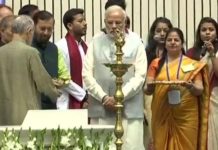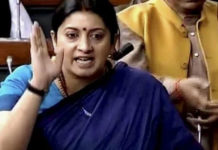Ziya Us Salam’s “Till Talaq Do Us Part” defogs the miasma around the issue of instant triple talaq
Triple talaq is a phrase that the citizens of India became acutely aware of post the events of 2017, when seven women petitioners moved the Supreme Court against their instant divorce brought about through the uttering of the words ‘talaq, talaq, talaq.’ The apex Court had, on August 22, ruled that instant triple talaq was a practice not sanctioned in the Quran, yet a fog of confusion and obfuscation surrounds the general discourse and public understanding of what exactly constitutes an Islamic divorce. In this context, Till Talaq Do Us Part (Penguin Random House) by senior journalist Ziya Us Salam is a book that acquires much significance as it tries to brush the dust away and bring clarity to the issue by reverting to the most authentic source for Islamic knowledge — the Quran.
Released this past evening at the India International Centre by Lt. Gen. (Retd.) Zamiruddin Shah, the book defines nine types of divorce interpreted from Quranic verses.
Among them some of the most important ones are Khula, the inalienable right of the woman to instantly divorce her husband on the grounds of his inability to take care of her needs or even simply her dislike for him; Talaq e Ehsan where the man pronounces divorce once but the woman lives with him for the next three months, after which he can divorce her or they can reconcile; Talaq e Hasan where the man pronounces divorce three times in three months, but only in the interim periods of menstrual cycles; Mubarat which takes place through mutual consent, Faskh or judicial divorce; Talaq e Tafweez which is incorporated into the Nikahnama wherein the husband vests the rights of divorce in his wife.
Lack of information
“In the present scenario within the country, the right information on Islam was not reaching the masses,” says Salam. Which is why he decided to write this book that talks about numerous aspects of marriage including the model nikahnama that the AIMPLB spoke of circulating but never quite got down to the task. He also speaks of the importance of meher, the dower paid by the man to the woman at the time of marriage, and how it is entirely neglected among Muslims in India. The meher must be paid either in full to the woman at the time of nikah, or in part with the husband giving a written undertaking that he would pay the rest in future, he emphasises. “One of the most important things is to have one regular nikahnama for all Muslims — at the most two, one for Sunnis and the other for Shias — but ideally, just one.”
Understanding halala
The book also deals with the highly controversial issue of halala, which in truth has been contorted and disfigured heavily into an abhorrent act of female exploitation. Halala, explains Salam, actually gives a woman the right to choose.
If perchance a woman’s second husband either passes away or the second marriage too results in divorce, she has the right to go back and choose her first husband again. However, with the entirely invalid and un-Quranic practice of triple talaq, instant divorces are carried out in a fit of anger and when the man comes to his senses and wishes to reconcile with the woman, they are forced into a monstrous distortion of Halala. When triple talaq gets pushed out of the scene, the question of a one-night halala would not arise at all.
Several scholars state that triple talaq was made legal by Umar Ibn Khattab, the second Caliph in Islamic history. “The important fact which is overlooked, though, is that it was made legal upon the condition that the man giving triple talaq would be flogged,” he highlights. “So why do the maulanas forget to flog the men giving triple talaq?”
A very important point here is that instant triple talaq did not exist at the time of Prophet Mohammad at all, nor the time of the first Caliph. Equally pertinently, it was later made entirely invalid and illegal by Ali Ibn Abi Talib, the fourth Caliph of Islam.
Many Islamic countries have made the instant talaq illegal and it is non-existent among the Shia sect. In fact it is illegal in all other sects except the Hanafis, but as the author writes in his book, “there is no direct word from Imam Hanifa on triple talaq.”
But social structures are rigid and herd tendencies difficult to change, which is why the Supreme Court judgement against instant triple talaq cannot be enough, just as dowry and caste system still exist despite being grossly unconstitutional. In addition, the maulanas whom the masses look to for religious guidance are ill-equipped for the task, caught as they are between rote-recitation and following customs without an attempt at understanding. “Across the country, a vast number of Imams don’t even know (the meaning of) what they have read in namaz!” avers Salam. “They prevent women from coming to mosques but at the Kaaba in Mecca, women and men pray together, perform Hajj together. There is no restriction at all upon women praying in mosques.”
The important task, then, is for the community to be educated and made aware of their rights, for people to read translations of the Quran and develop a deeper understanding. One may pick any translation and exegesis among the many reputed ones, but the most important thing is to explore. In addition, the men must be made aware of the rights of women as much as the women themselves. As Salam says, “We have reduced the understanding of the Quran to the monopoly of some aalim. But the Quran came for all of humanity, not a select group of scholars.”

 India
India





















